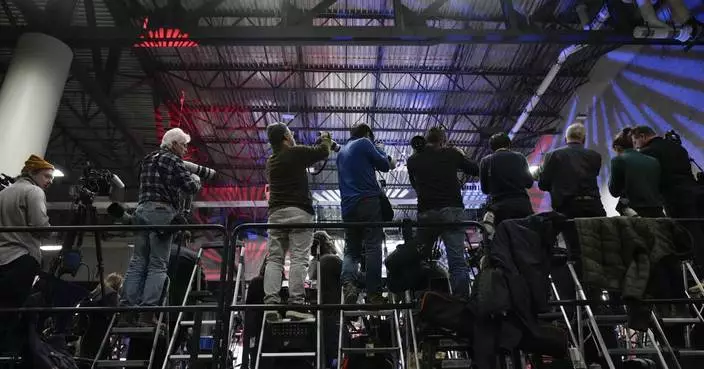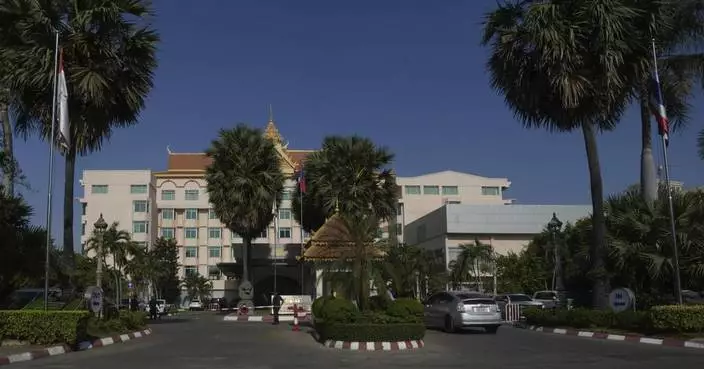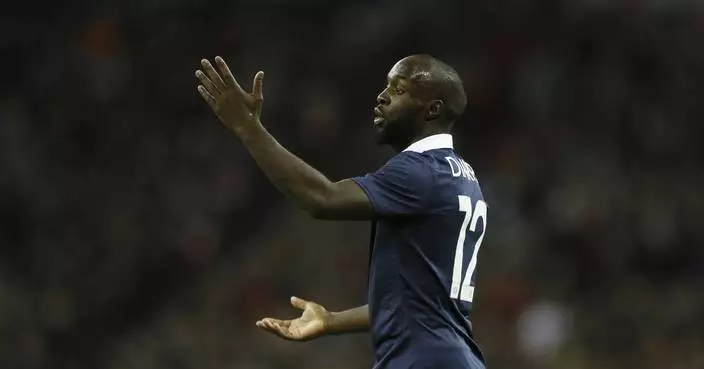The three members of Bosnia's multi-ethnic presidency will meet Tuesday to try to break a deadlock on forming a new government, more than ten months after the general election in October.
An agreement between Bosnia's Muslim, Serb and Croat leaders is crucial because the lack of a government has stalled economic development in the Balkan nation that is still recovering from a devastating 1992-95 war.
But disagreements between Bosnia's pro-Russian Serbs and the other two groups over Bosnia's future relations with NATO could hamper the government deal, plunge the country deeper into crisis and exacerbate ethnic divisions. Here's a look at Bosnia's complex political situation:
WHO'S WHO IN BOSNIA?
Bosnia is governed by a three-member presidency that has Serb, Muslim and Croat representatives and is divided into two semi-autonomous regions, one ruled by Bosnian Serbs and the other by Muslims and Croats.
Its election last year mainly saw nationalist parties and politicians from those three groups win the most votes in their regions. The pro-Russian Bosnian Serb leader, Milorad Dodik, who repeatedly argues that Bosnia should not exist as a unified country, became the Serb member of the Bosnian presidency. Dodik's party also won the parliamentary election in the Serb half of the country while nationalist parties among Muslims and Croats won in their joint entity. In an exception, moderate politician Zeljko Komsic became the Croat member of Bosnia's joint presidency but his election did little to bridge Bosnia's sharp ethnic divide.
WHY IS IT SO HARD TO FORM A GOVERNMENT IN BOSNIA?
Bosnia went through a bloody ethnic war in the 1990s that killed more than 100,000 people and left millions homeless. To stop the war, the U.S.-brokered peace deal in 1995 created Bosnia's complicated network of governing institutions that include its three-member presidency, the Council of Ministers that is the de facto government and several assemblies within the entities. In order to form the joint national government, politicians from the three ethnic groups must all agree on the division of ministries and the future policies. Western officials had hoped Bosnians would eventually reform this complicated system as time went on, but this has not happened.
WHAT IS THE MAIN PROBLEM?
The main stumbling block is whether Bosnia will move toward joining NATO by submitting a plan for reforms that are needed to do so. NATO last year gave the green light to Bosnia to advance, but the country's Serbs — who are Orthodox Christians and staunchly pro-Russian — are strongly opposed to the idea. The NATO question has stalled the formation of a new government, with the Muslim and Croat presidency members insisting on NATO reforms and Dodik, the Serb member of the presidency, saying he will only accept Bosnia's European Union membership goals, not eventual NATO membership.
WHY IS THIS IMPORTANT?
The dispute reflects a mounting conflict between the West and Russia over the future of the Balkans. While the West wishes to see the still-volatile region reform and eventually join the EU and NATO, Russia has used its historic ties with Serbs to undermine this idea. After another Balkan historical ally, Montenegro, turned its back on Moscow and joined NATO in 2017, Serbia and the Serb-run Republika Srpska in Bosnia have remained the only allies of the Kremlin in the region. Serbia has claimed military neutrality and the Bosnian Serbs have said they will follow suit.
WHAT DOES THIS MEAN FOR BOSNIA?
If there's no agreement to form a national government, Bosnia will likely face further political crisis that would cement its ethnic divisions. A deadlocked Bosnia will remain behind other Balkan EU hopefuls, diminishing hopes of a better future for the country's youth, who are already leaving by the tens of thousands each year. Corruption is ripe and nationalist politicians could easily foster further fragmentation along ethnic lines.
The instability in Bosnia also means instability in the entire Balkans, where the West also is trying to restart talks between Serbia and Serbia's former province of Kosovo on normalizing their ties after Kosovo declared independence in 2008, a move Belgrade does not recognize.
Jovana Gec contributed from Belgrade, Serbia.
BEIRUT (AP) — The European Union announced Thursday an aid package for Lebanon of 1 billion euros — about $1.06 billion — much of which will go to boost border control to halt the flow of asylum seekers and migrants from the small, crisis-wracked country across the Mediterranean Sea to Cyprus and Italy.
The deal follows other EU aid packages for countries such as Egypt, Tunisia and Mauritania to fortify their borders. It comes against a backdrop of increasing hostility toward Syrian refugees in Lebanon and a major surge in irregular migration of Syrian refugees from Lebanon to Cyprus.
European Union Commission President Ursula von der Leyen said during a Beirut visit with Cypriot President Nikos Christodoulides that the aid distribution will start this year and last till 2027.
The bulk of the aid — 736 million euros — would go to support Syrian refugees “and other vulnerable groups” in Lebanon, while 200 million euros are meant to bolster Lebanese security services in enforcing border and migration control, according to figures provided by the Cypriot government.
An unspecified amount would go to Lebanese fishermen, to discourage them from selling their boats to smugglers.
Von der Leyen said the EU will also work on a “more structured approach to voluntary return" of Syrian refugees "in close cooperation with” the U.N. refugee agency. The bloc will continue to maintain “legal pathways” for resettlement of refugees in Europe, she said.
Lebanon's caretaker Prime Minister Najib Mikati praised the package, saying that “Lebanon’s security is security for European countries and vice versa,” and that an escalation of the crisis ”will not be limited to Lebanon but will extend to Europe."
Lebanon, which has been in the throes of a severe financial crisis since 2019, hosts nearly 780,000 registered Syrian refugees and hundreds of thousands more who are unregistered, the world's highest refugee population per capita.
Lebanese political officials have for years urged the international community to resettle the refugees in other countries or assist their return to Syria — voluntarily or not. Lebanese security forces have stepped up deportations of Syrians over the past year.
Tensions further flared after an official with the Christian nationalist Lebanese Forces party, Pascal Suleiman, was killed last month in what military officials said was a botched carjacking by a Syrian gang. The incident prompted outbreaks of anti-Syrian violence by vigilante groups.
Meanwhile, Cypriot authorities complain the island nation has been overwhelmed by irregular migration of Syrian asylum seekers, many of them coming on boats from Lebanon.
The UNHCR in Lebanon said it had verified 59 “actual or attempted” departures by boats carrying a total of 3,191 passengers from Lebanon between January and mid-April, compared to three documented boat movements carrying 54 passengers in the same period last year. Usually, few boats attempt the much more dangerous crossing in the winter. In all of 2023, UNHCR recorded 65 boat departures carrying 3,927 passengers.
Cyprus has taken a new approach to halting the flow of migrants. Last month, it suspended processing of Syrian asylum applications, and human rights groups accused the Cypriot coast guard of forcibly turning back five boats carrying about 500 asylum seekers coming from Lebanon. Cypriot officials have denied this.
Bassel al-Shayoukh, a Syrian refugee from Idlib living in Lebanon since 2014, said his brother and several cousins and nephews were on one of the boats turned back. Now he wants to make the journey himself.
“In the beginning I thought that in a year or two the war would be over in Syria,” he said, but it dragged on, while in Lebanon “every year ... the situation began to get worse.”
Shayoukh said he fears being beaten by vigilantes or deported to Syria after Lebanese authorities declined to renew his residency permit.
His 17-year-old nephew, who declined to give his name fearing for his safety, said the Cypriot coast guard started making waves to push the boat he was on away. “I was terrified... I don’t know how to swim,” he said. “I thought we were going to die.”
The people on the boats “stayed three days without food or water” before turning back to Lebanon, the teen added.
Back in Lebanon, they were detained by the army; those registered with UNHCR were released and the others deported.
Mohammed Sablouh, a Lebanese human rights lawyer who works on refugee and migrant cases, says Lebanese authorities are deliberately “turning a blind eye" to the surge in migration to "pressure the international community.”
The Lebanese army did not respond to a request for comment on their measures to combat smuggling.
Thursday's aid announcement comes ahead of the annual fundraising conference for the Syrian crisis in Brussels later this month. After 13 years of civil war, donor fatigue has set in while the world’s attention is occupied by the humanitarian fallout of more recent conflicts in Ukraine and Gaza.
The Cypriot president said Thursday was a “historic day” and called for European officials to go farther and declare some areas of Syria safe for return.
“The current situation is not sustainable for Lebanon. It is not sustainable for Cyprus, it is not sustainable for the European Union,” Christodoulides said.
But not all Lebanese officials are convinced the European aid would solve the problem.
Lebanese Forces party head Samir Geagea told The Associated Press earlier this week that European authorities are mainly concerned “that the refugees don’t go to Europe."
"For us the problem is that we cannot have our country drowning in illegal Syrian refugees,” Geagea said, urging for Syrians to be sent back to either government or opposition-held areas of the neighboring country.
But Shayoukh says he has nowhere to go.
The Damascus government wants him for opposing Syrian President Bashar Assad, he said, while the Islamist group that now controls his hometown behaves "the same way as the regime’s intelligence services” in crushing dissidents.
Associated Press writer Menelaos Hadjicostis in Nicosia, Cyprus, contributed to this report.
Follow AP’s global migration coverage at: https://apnews.com/hub/migration

Lebanese caretaker Prime Minister Najib Mikati, center, speaks during his meeting with Cyprus' President Nikos Christodoulides, left, and President of the European Commission Ursula von der Leyen at the government palace in Beirut, Lebanon, Thursday, May 2, 2024. (AP Photo/Hassan Ammar)
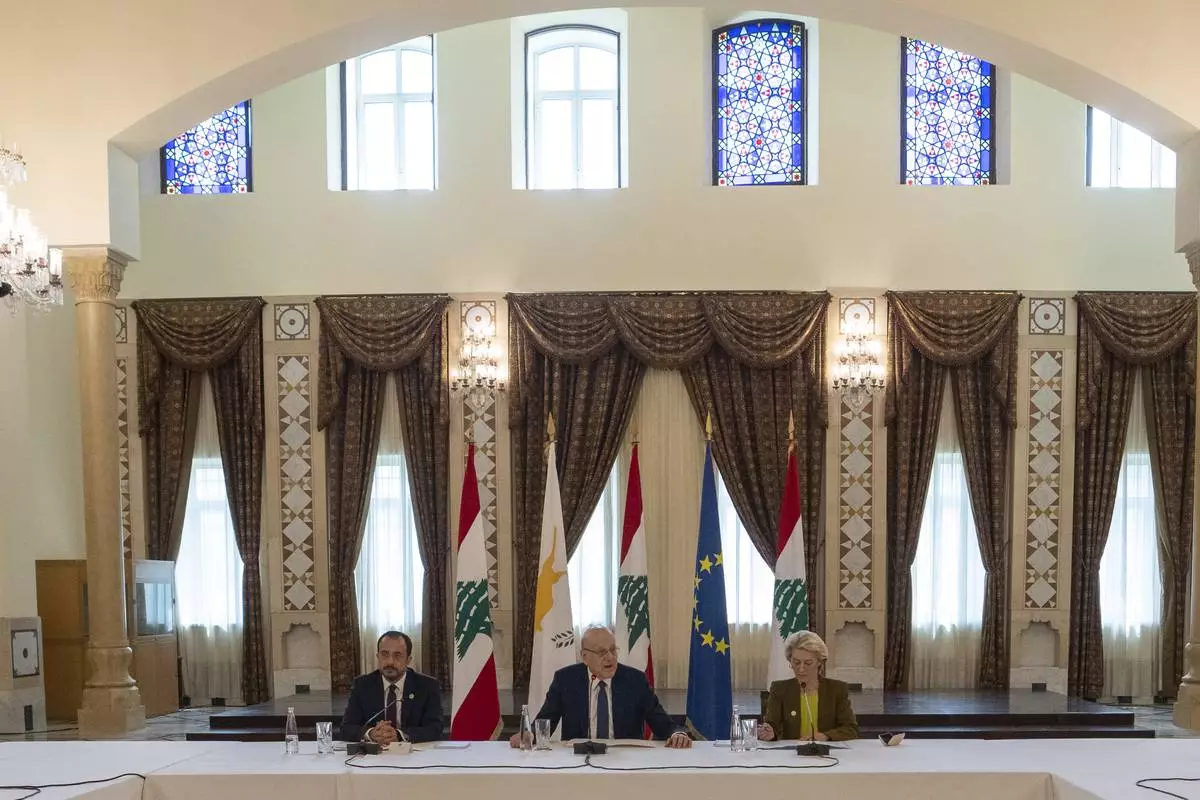
Lebanese caretaker Prime Minister Najib Mikati, center, speaks during his meeting with Cyprus' President Nikos Christodoulides, left, and President of the European Commission Ursula von der Leyen at the government palace in Beirut, Lebanon, Thursday, May 2, 2024. (AP Photo/Hassan Ammar)
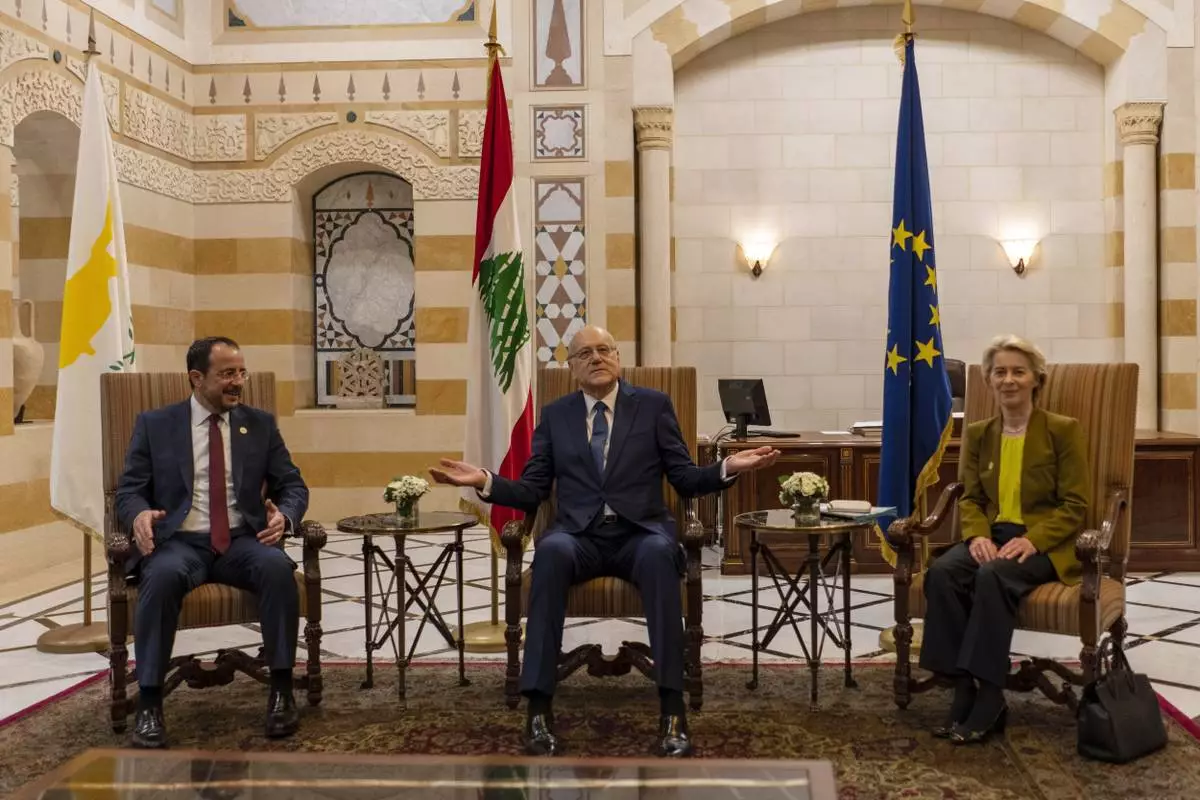
Lebanese caretaker Prime Minister Najib Mikati, center, welcomes Cyprus' president Nikos Christodoulides, left, and President of the European Commission Ursula von der Leyen before their meeting at the government palace in Beirut, Lebanon, Thursday, May 2, 2024. (AP Photo/Hassan Ammar)
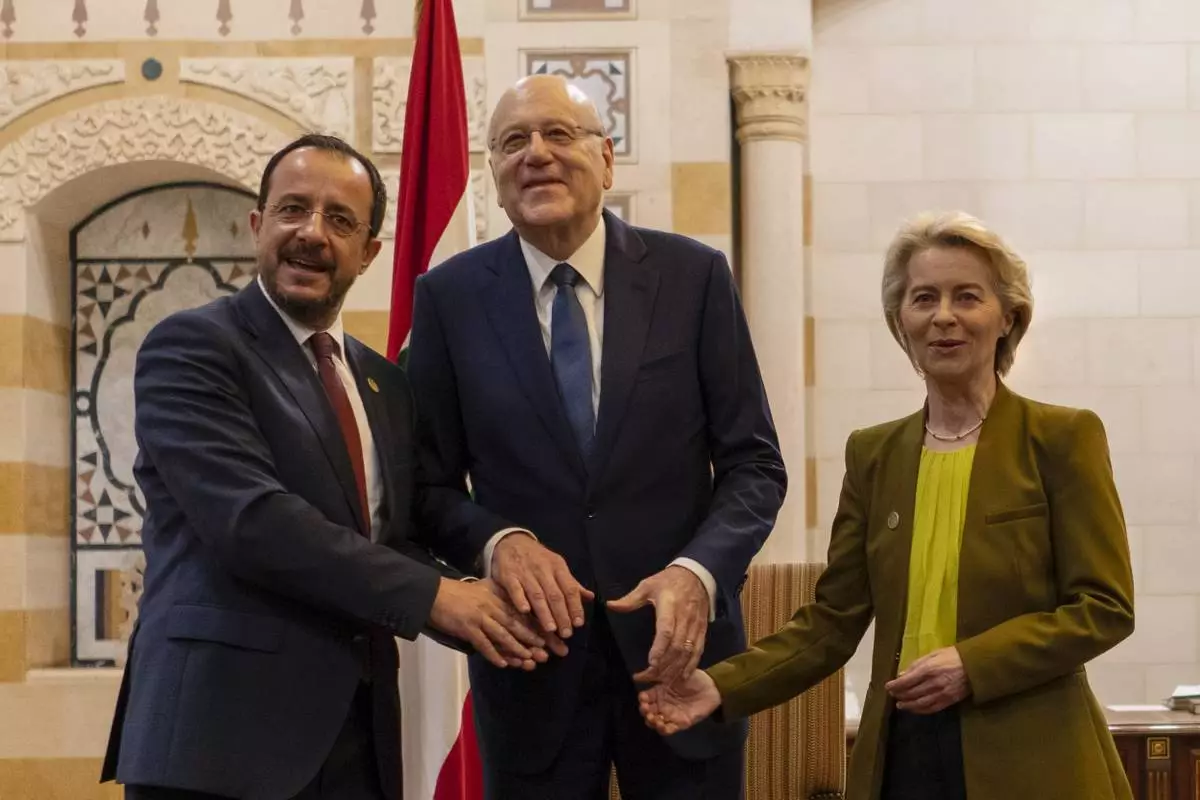
Lebanese caretaker Prime Minister Najib Mikati, center, Cyprus' President Nikos Christodoulides, left, and President of the European Commission Ursula von der Leyen pose for photograph at the government palace in Beirut, Lebanon, Thursday, May 2, 2024. (AP Photo/Hassan Ammar)
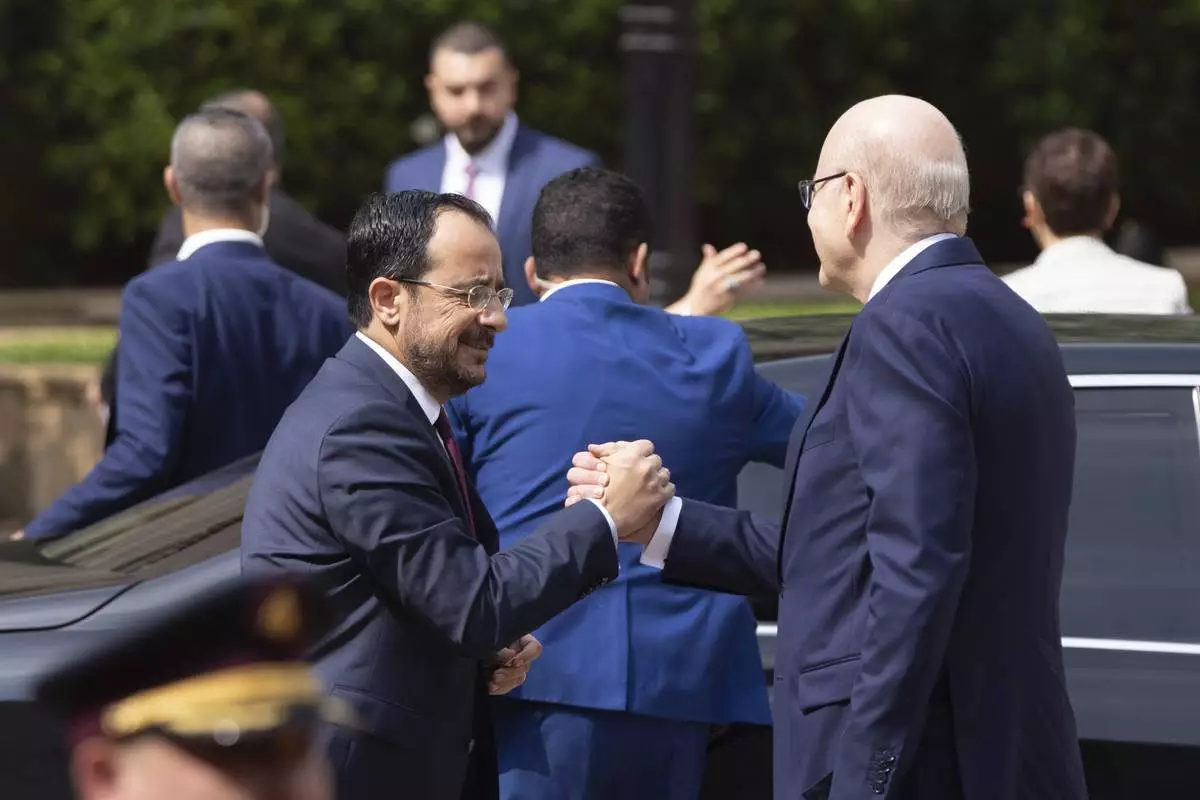
Lebanese caretaker Prime Minister Najib Mikati, right, welcomes Cyprus' president Nikos Christodoulides before their meeting at the government palace in Beirut, Lebanon, Thursday, May 2, 2024. (AP Photo/Hassan Ammar)

Cyprus' President Nikos Christodoulides, left, and President of the European Commission Ursula von der Leyen, center, review an honor guard upon their arrival to meet with the Lebanese Speaker Nabih Berri, in Beirut, Thursday, May 2, 2024. (AP Photo/Hussein Malla)

Lebanese caretaker Prime Minister Najib Mikati, center, speaks during his meeting with Cyprus' President Nikos Christodoulides, left, and President of the European Commission Ursula von der Leyen at the government palace in Beirut, Lebanon, Thursday, May 2, 2024. (AP Photo/Hassan Ammar)
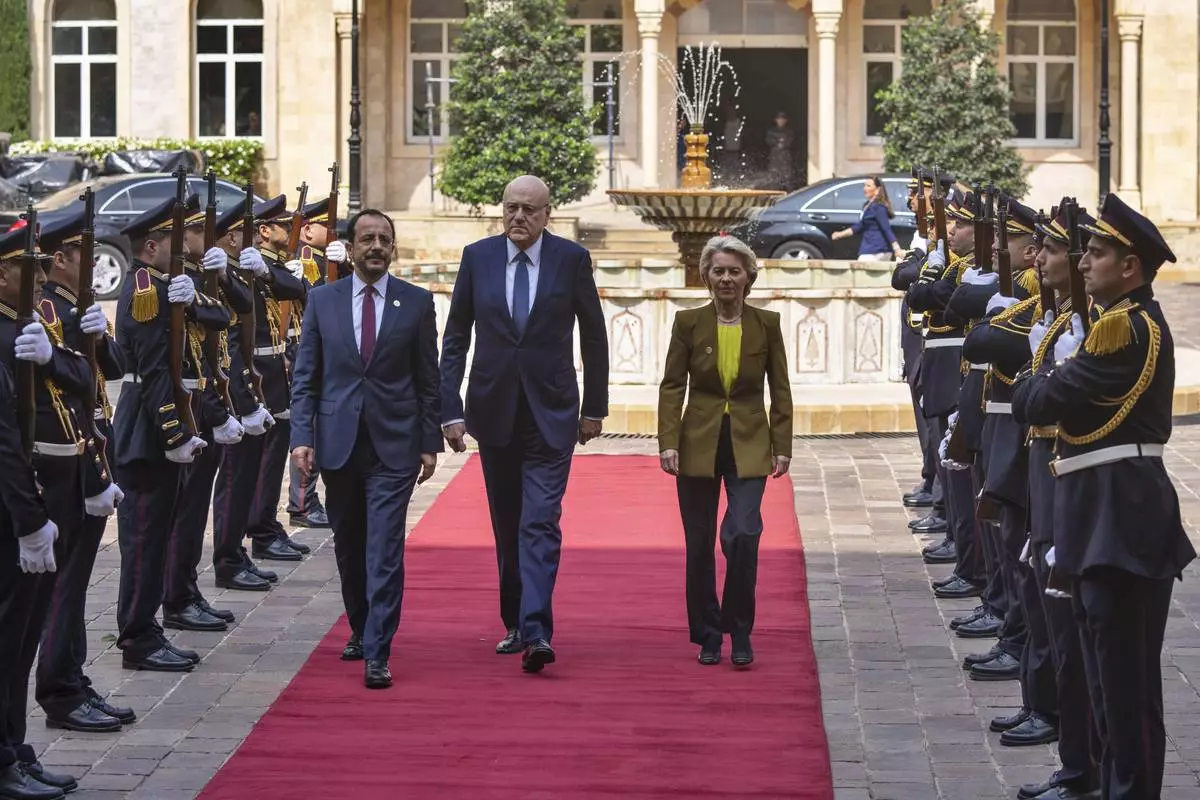
Lebanese caretaker Prime Minister Najib Mikati, center, welcomes Cyprus' President Nikos Christodoulides, left, and President of the European Commission Ursula von der Leyen at the government palace in Beirut, Lebanon, Thursday, May 2, 2024. (AP Photo/Hassan Ammar)











